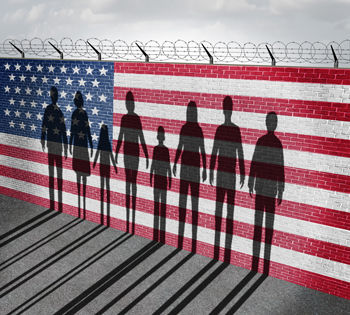Video teleconference program for immigrant children 'is contrary to the American pursuit of justice,' ABA says

Image from Shutterstock.com.
ABA President Judy Perry Martinez joined leaders from Kids in Need of Defense on Wednesday in condemning a new pilot program at the Houston Immigration Court that requires all cases involving unaccompanied immigrant children to be heard via video teleconference.
Under the program, the Trump administration calls for the testimony of unaccompanied children to be streamed from Houston to Assistant Chief Immigration Judge Sirce Owen, who will hear cases in Atlanta. The program will begin March 9 and last for about two months.
“What is about to happen in Houston is wrong,” Martinez said during a briefing on the program. “It will hurt children and is contrary to the American pursuit of justice. The American Bar Association opposes the policy, and we need action against it now.”
Martinez explained that the ABA Commission on Immigration has extensive experience with children in immigrant courts and created standards of care and conduct based on its experience. She said that among those standards is a strong opposition to video teleconferencing in immigration proceedings involving children.
She recalled visiting a children’s shelter during one of her trips to volunteer with the ABA’s South Texas Pro Bono Asylum Representation Project. She thought then about what runs through the mind of an unaccompanied child who just entered the United States and must go to court.
“For a child, it must be truly troubling, if not terrifying—especially for a child who doesn’t speak English, who doesn’t know what to expect in a U.S. courtroom and who may not have a lawyer or other trusted adult to guide him or her,” she said. “Imagine how much more bewildering that experience must be for a child in a courtroom with no judge in person, live there with them. Only a small TV screen.”
Martinez contended that children may not understand the role of the people on the screen or that those people are making decisions that affect their lives. If they feel disconnected, she said they are less likely to talk and more likely to lose their cases.
Jason Boyd, director of policy at Kids in Need of Defense, said the pilot program in Houston could impact as many as 1,500 children. He said it could also be the first step toward the establishment of a single national video teleconference docket that encompasses every detained, unaccompanied child in the country.
He pointed to other due process concerns with remote hearings, including camera positions that may diminish children’s ability to see their interpreter or judge or audio issues that prevent them from hearing the proceedings. The use of video teleconference may also make it difficult for them to interact with their attorneys, who he said may be forced to appear in Atlanta with the judge and U.S. Immigration and Customs Enforcement attorneys.
In doing so, Boyd said those attorneys forgo the option to confer with their clients, who are then at risk of making uninformed decisions that affect their future. On the other hand, he added, attorneys who stay in Houston may be unable to properly observe or respond to proceedings themselves.
“The first choice is a bad one, unfortunately; so is the second,” he said. “To ensure due process and fundamental fairness in these children’s proceedings, the only viable option is for [the Executive Office for Immigration Review] to pull the plug altogether on this VTC pilot.”
Kids in Need of Defense President Wendy Young contended that two other policy changes by the Trump administration also target unaccompanied children and undermine their access to protection in the United States.
The Office of Refugee Resettlement recently issued a directive that requires legal services providers to meet unaccompanied children in their facilities rather than in their counsel’s offices—a move that Young said will restrict children’s access to legal representation and exacerbate challenges associated with the recruitment of pro bono attorneys who can take their cases.
In addition, Young said the Executive Office for Immigration Review reiterated in January that immigration judges should complete unaccompanied children’s cases within 60 days, a standard that could make it impossible for children to obtain counsel or file applications that could keep them from being deported.
“In isolation, any of these changes would substantially limit the ability of unaccompanied children to receive a fair day in court,” Young said. “Taken together, they pose what for tens of thousands of kids could prove to be insurmountable barriers to humanitarian protection in the United States and may result in their return to further harm and even death.”
Martinez and the Kids in Need of Defense leaders called on the Trump administration to cancel the Houston pilot program and reverse the other policies that adversely affect unaccompanied children. They also called on Congress to conduct additional oversight and direct the agencies to put an end to the policies.
See also:
ABA Journal: “ABA president calls for creation of independent immigration courts, criticizes ‘remain in Mexico’ policy”
ABA Journal: “For 30 years, ProBAR has served immigrants and refugees at the southern border”
ABA Journal: “Commission on Immigration urges widespread reform”



